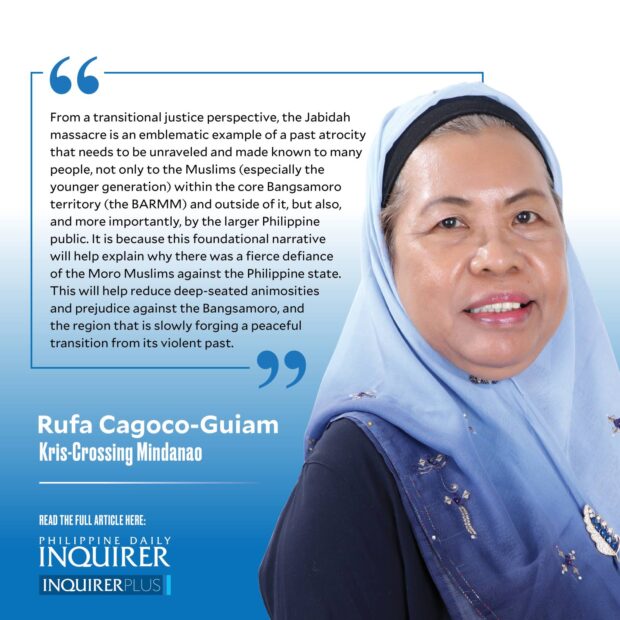Jabidah massacre and transitional justice
 Last Saturday, March 18, was the 55th anniversary of the incident that provided the foundational narrative on the origins of the Bangsamoro struggle for their right to self-determination. This was the historic and tragic Jabidah massacre on March 18, 1968.
Last Saturday, March 18, was the 55th anniversary of the incident that provided the foundational narrative on the origins of the Bangsamoro struggle for their right to self-determination. This was the historic and tragic Jabidah massacre on March 18, 1968.
The three-year-old Bangsamoro autonomous region has declared March 18 as “Bangsamoro Freedom Day” to commemorate the Jabidah massacre, where around 200 Moro young men were killed on Corregidor Island. This bloody incident provided a strong impetus for a group of young Moro students to organize the first group of Moro rebels that fought against the forces of the Philippine state, the Moro National Liberation Front (MNLF).
According to the Stanford Center for International Security and Cooperation’s profile on the MNLF, the Jabidah massacre killed an “unknown number of young Moro Muslim soldiers” trained to participate in a military operation. This operation was reportedly dubbed “Merdeka” (freedom) but the recruits were not officially treated as Philippine military soldiers.
Jabidah/Operation Merdeka was supposed to be a clandestine plan of the military, under orders of President Ferdinand Marcos Sr. to annex some parts of Sabah that were allegedly part of the Philippine national territory. But it had to be done first through this operation of recruiting young Moro soldiers who were to become commando forces to do the dirty work of creating trouble in Sabah first—after all, they were expendable. Jibin Arula disclosed that they were told that if they get caught in Sabah, the Philippine military will just explain to Malaysian authorities that the Moro soldiers belong to the military force of Muslim sultans, and are not officially members of the Philippine armed forces.
The young Moro recruits, Tausug and Sama, came from very poor families and had very little education. Arula himself said he only finished up to Grade 2 in formal education. Many of them could not read and write. The military drafting for them was like a blessing since they were thinking they can become full-fledged soldiers after the training.
Without the narrative of the Jabidah massacre, there would have been no Bangsamoro autonomous government now. This is how profoundly important this foundational narrative is, no matter how much the enemies of peace will dub it a hoax to justify the Muslim “insurgency” against the Philippine government.
In addressing historical grievances brought about by past atrocities committed by state agents, the narratives of the lone survivor and the existing remnants of the actual location of the young Moro recruits’ quarters on Corregidor Island are already quite substantial to compel the Philippine state to acknowledge that this incident happened. And in fact, it did. On March 18, 2013, an ABS-CBN report by Willard Cheng said the Philippine government, for the very first time, has acknowledged that the Jabidah massacre actually happened.
From a transitional justice perspective, the Jabidah massacre is an emblematic example of a past atrocity that needs to be unraveled and made known to many people, not only to the Muslims (especially the younger generation) within the core Bangsamoro territory (the BARMM) and outside of it, but also, and more importantly, by the larger Philippine public. It is because this foundational narrative will help explain why there was a fierce defiance of the Moro Muslims against the Philippine state. This will help reduce deep-seated animosities and prejudice against the Bangsamoro, and the region that is slowly forging a peaceful transition from its violent past. It will also help the process of real nation-building, creating a more inclusive government not only in the region but at the national level as well.
Comments to [email protected]















